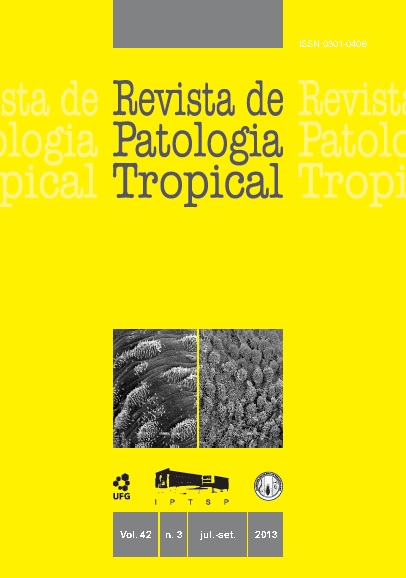VISCERAL LEISHMANIASIS: EPIDEMIOLOGICAL ASPECTS RELATED TO DEATHS IN MOSSORO, STATE OF RIO GRANDE DO NORTE, BRAZIL
DOI:
https://doi.org/10.5216/rpt.v42i3.26928Keywords:
Visceral Leishmaniasis, Mortality, EpidemiologyAbstract
Visceral leishmaniasis is an emerging zoonosis widely distributed in countries with tropical and subtropical climates. In Brazil it has great public health significance, with high rates of incidence and mortality. This study aimed to analyze epidemiological aspects related to deaths due to visceral leishmaniasis in Mossoro, State of Rio Grande do Norte, Brazil. The descriptive epidemiological method was used and the data were obtained through the Brazilian information systems for the surveillance of notifiable diseases (Sistema de Informação de Agravos de Notificação – SINAN) and mortality (Sistema de Informação de Mortalidade – SIM), provided by the Brazilian Ministry of Health, in the Division of Epidemiology of the Departament of Health Surveillance in Mossoro. This study analyzed data from 2007 to 2011 and the variables studied were: mortality rate, sex, age, place of residence, occupation, duration of the disease, mean time from the first symptoms to the initial treatment, mean time from the initial treatment to death, and associated diseases. 18 deaths were registered during the study period, among 158 diagnosed cases. This represents a mortality rate of 11.4%, which is greater than the national average (5.8%). The mortality rate increased in the last three years (2009 – 4.9%, 2010 – 12%, 2011 – 17.4%). Most deaths occurred in males (61.1%), but the mortality was greater for females (13.7%) than for males (10.3%). The older the patient, the higher the mortality, and it was higher for people over 65 (100%). The deaths mainly occured in patients of lower socioeconomic status, for whom the disease quickly progressed to death (33.3% in less than one month). Late diagnosis, comorbidities and complications were seen to increase mortality.Downloads
Downloads
How to Cite
Issue
Section
License
The manuscript submission must be accompanied by a letter signed by all authors stating the full name and email address, confirming that the material has not been published or is under consideration for publication elsewhere, and agreeing to transfer copyright in all media and formats for Journal of Tropical Pathology. The authors will not be paid for published articles. They are solely responsible for the content of those articles, even if the Editor holds the right to adjust them to the norms of the journal.
The reviewers will not be paid for the peer review process.

